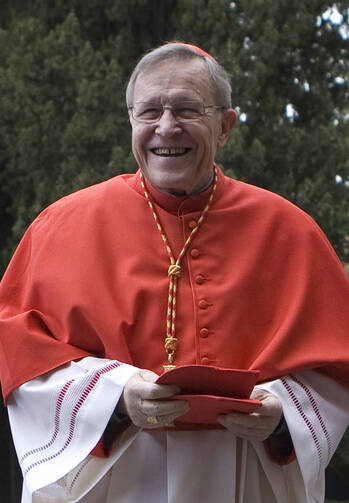In its approach to divorced and civilly remarried Catholics, the Catholic Church needs to find a middle ground that does not destroy or abandon doctrine, but offers a "renewed" interpretation of church teaching in order to help those whose marriages have failed, Cardinal Walter Kasper said.
"I propose a path that goes beyond strictness and leniency," the German cardinal and theologian told Vatican Radio March 10.
An approach that avoids the two extremes "isn't against morality, it isn't against doctrine, but rather, (is meant) to support a realistic application of doctrine to the current situation of the great majority of people and to contribute to people's happiness," he said, speaking in Italian.
The cardinal was referring to a lengthy talk he had given to introduce a Feb. 20-21 discussion by the College of Cardinals on family life. The talk, titled "Gospel of the Family," was to be published in March in German and Italian by private publishing houses.
Cardinal Kasper told Vatican Radio that the responses to a widely distributed Vatican questionnaire about Catholics' family life -- drawn up in preparation for October's Synod of Bishops on the family -- showed "there is a difficulty, an abyss" between church teaching and the actual situation of many people.
"The church has to bridge this abyss," he said, speaking in English; but that "does not mean pure appeasement policies, but the church must explain in a new way what family and matrimony are in order to help people and at the same time remain faithful to the Gospel."
The cardinal said a similar process might be seen in how the church developed its current approach to ecumenism.
"There were doctrines of the Holy Office (Congregation for the Doctrine of the Faith) before the (Second Vatican) Council against ecumenism, yet the council found a way not to destroy or negate the doctrine but found ways to interpret it in an adequate way," he said.
"I ask myself why it could not be possible also with other doctrines," he said.
He said he wouldn't call such changes "a revolution, as much as a deepening and a development because the doctrine of the church is a river that develops and also the doctrine of matrimony has developed like this."
"It's not about something new as much as a renewal of church practice, which is always necessary and possible," he said.
The primary purpose of his speech to the cardinals, he said, "was not to speak about divorced and remarried people, but to speak about the Gospel of the family" and to foster "a new, better, more deep understanding of family life" as God intended -- built on a faithful, exclusive and lifelong union between one man and one woman.
"I think the majority of young people want stable relationships, want to live in a family... and therefore, the church has to help them," he said.
"We have to once again strengthen" the sacramental and indissoluble bond of marriage, especially as families today are facing a number of crises, including severe economic difficulties.
The church must also take into account the many situations of Catholics who have failed marriages, he said, adding that "the church has to be close to them, to help, support and encourage them."
"I maintain the full teaching of the church, but the teaching has to be applied to concrete situations, as Jesus did it and as Pope Francis does very often," he said.
"The doctrine of the church is not an ideology in the clouds, but God wants to be present, close to his people," he said.








